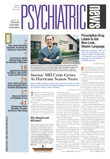Physicians in New Jersey will be required to educate expectant mothers and their families about the signs and symptoms of postpartum depression and screen new mothers for the disorder under a new law signed in April by Gov. Jon S. Corzine (D).
The legislation, known as Public Law 2006 c12, will take effect in October. New Jersey is believed to be the first state to enact such legislation, according to a spokesperson in the New Jersey Department of Health and Senior Services.
“The birth of a child is a time for celebration, but also a time for concern as 80 percent of women in New Jersey experience some form of depression after giving birth,” Corzine said at the signing ceremony at the Hackensack University Medical Center in April. “This new law will make postpartum depression screening a requirement rather than an option, and that's a significant and positive step for New Jersey's mothers, newborns, and families.”
As part of the new law, the Department of the New Jersey Commissioner of Health and Senior Services has been charged with working with the State Board of Medical Examiners and the New Jersey Board of Nursing and a variety of health care professionals and hospitals to implement the law.
Celeste Andriot-Wood, assistant commissioner of New Jersey's Division of Family Health Services, told Psychiatric News that the state will work with the boards of medical examiners and nursing “to inform licensees of the legislation, best practices, and what types of screening tools and resources are available.”
Andriot-Wood also said that the state boards will have the authority to sanction physicians or nurses who fail to comply with the law.
According to an April press release from Corzine's office, about 80 percent of women in New Jersey experience some level of depression after giving birth, but typically, the symptoms abate after two weeks and are sometimes known as the “baby blues.” However, postpartum depression, characterized by symptoms that are persistent and disrupt the mother's functioning, affects about 1 in 8 women, or 11,000 to 16,000 women statewide.
State Senate President and former N.J. Gov. Richard Codey (D-Essex) allocated $4.5 million to educating families and screening new mothers for postpartum depression last year while serving as acting governor (Psychiatric News, May 20, 2005). He cosponsored the bill along with Sen. Diane Allen (R-Morris, Somerset).
At the signing, Corzine pledged to keep the funding intact.
Codey's wife, Mary Jo, has openly discussed her experiences with postpartum depression. About 20 years ago, she first experienced postpartum depression and had thoughts of harming her infant son. With psychiatric treatment, her condition improved.
In April 2005, Codey appointed a statewide workgroup headed by Fred Jacobs, M.D., J.D., commissioner of the New Jersey Department of Health and Senior Services, to develop policies and procedures that would later form the framework for the legislation.
The Governor's Workgroup on Postpartum Depression was divided into several subcommittees, one of which was charged with developing educational materials for physicians and allied health professionals that would enable them to screen new mothers for postpartum depression and educate women and their families about the condition.
Psychiatrist Ricardo Fernandez, M.D., served as chair of the Professional Education subcommittee and representative to the New Jersey Psychiatric Association (NJPA).
Fernandez told Psychiatric News that the subcommittee was primarily concerned about the identification of women with postpartum depression.
“Many of these women were falling through the cracks,” he said, and were “lost in the transition from the obstetrician to pediatrician and primary care.”
He also noted that although many clinicians are “willing and able to inform mothers of the many complications that can accompany pregnancy, labor, delivery, and postpartum, in general they are much more recalcitrant to inform them of the risks of psychiatric disorders. This is likely the result of the deeply ingrained stigma that exists in our society in discussing mental illness,” he said.
Fernandez is an associate professor of clinical psychiatry at the University of Medicine and Dentistry of New Jersey and medical director of Princeton Family Care Associates in Princeton, N.J.
Nancy Block, M.D., past president of the NJPA, served on the Professional Education Subcommittee as representative to the Medical Society of New Jersey. Block said that the subcommittee consisted of a range of health care professionals who developed a “Webinar” or a Web-based video to teach physicians, including psychiatrists, nurses, psychologists, social workers, and other health care professionals such as lactation consultants and Lamaze instructors not just about postpartum depression, but also peripartum mood disorders. Continuing medical education credit is available to those who take the 70-minute course online.
“We are not just talking about unipolar depression that takes place postpartum,” Block told Psychiatric News. “We are talking about what is in many cases a lifelong predilection to mood disorders that may be intensified during and after pregnancy.”
In addition to preparing the educational material for New Jersey clinicians, Fernandez said, the state “trained the trainers” on how to use the educational materials through a series of statewide symposia, conferences, and grand rounds.
Andriot-Wood said that in the past seven months, the state has trained more than 4,500 doctors, nurses, psychologists, and social workers to educate other health professionals about postpartum depression and peripartum mood disorders.
The Webinar for health professionals, as well as the Edinburgh Postnatal Depression Scale, a 10-item questionnaire often used to screen for postpartum depression, and educational materials for the public are posted on the New Jersey Department of Health and Senior Services postpartum depression Web site, “Recognizing Postpartum Depression: Speak Up When You're Down.”
The Web site also includes materials in English and Spanish that physicians and other health professionals can give to their patients to educate them about postpartum depression.
The text of Public Law 2006 c12 can be accessed at<www.njleg.state.nj.us/bills/BillsByNumber.asp> by searching under “S213.” Materials for screening and education on postpartum depresion as part of the New Jersey law are posted at<http://nj.gov/health/fhs/ppd/home.shtml>.▪
